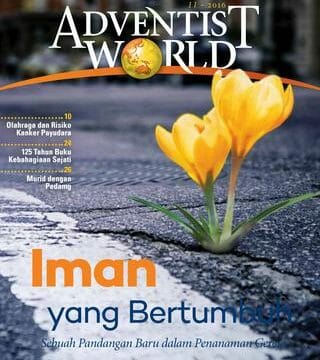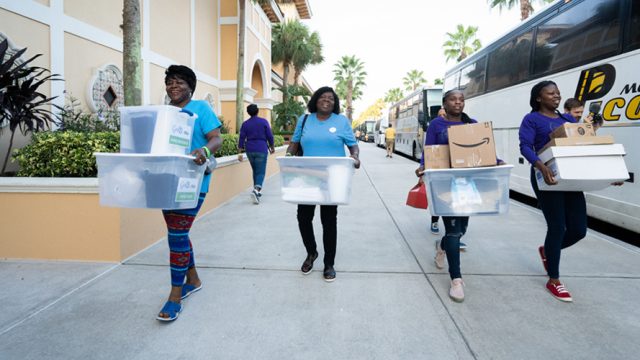Learning to hang on to the God who loves us

23 long days. I ́m staying at home. No signs of COVID-19, yet there are signs of loneliness. That ́s what many have been experiencing during this pandemic. What should we hold on to? What should we disregard under these circumstances?
APRIL 2020
Several weeks have passed since my social life has been turned upside down. Lockdown, restrictions, home office, and isolation have marked these past weeks. I go out only once a week to shop for groceries. Yet even that is quickly taken care of without really meeting people. Most people won’t even look at me while shopping, and as useful as video calls may be, they can never replace eye contact or the feeling of physical touch. Deeper questions rise to the surface: Who are the people most dear to me? What do I hold on to in life? Why am I alone? What awaits me tomorrow? Where will I find the strength to meet the new day? What shall I do with myself the whole time?
I jotted these lines into my prayer journal. As a young adult I’m emotionally affected by COVID-19. Instead of ignoring emotions I try to take a closer look. How is it going? Not too well. I miss hanging out with friends and talking to colleagues.
The Bible actually states that it’s not good for humanity to be alone (Gen. 2:18), and once we’re alone we realize just how true that is. We were made to be in relationships. We need one another. And in such a crisis our need surfaces.
LONG AGO
I remember an old Bible story. He was a successful and very influential man. He wasn’t only rich but also God-fearing, blameless, and upright. A man of honor. Suddenly, though, the tables were turned: his livestock was stolen or destroyed by natural disasters, and all his children died. Within days he lost everything he had loved. As if that wasn’t enough, he fell ill with a painful disease. This was too much for his wife. She told her husband to curse God and die.
How was Job dealing with these hardships? “For I know that my Redeemer lives, and He shall stand at last on the earth” (Job 19:25). Where did his confidence come from? What gave him the strength to stay faithful and live his faith under these circumstances?
Job is a great role model. He knew how to deal with suffering. “You have heard of the perseverance of Job and seen the end intended by the Lord—that the Lord is very compassionate and merciful” (James 5:11).
PERSEVERANCE
When there is no easy solution, we need patience. Job had to be patient to experience the end of his story. His faith in God gave him the strength to endure. He was hoping against hope that his story would turn out well, for he knew whom he believed in. He knew God to be merciful and compassionate.
WHO IS GOD REALLY?
Job didn’t take his riches for granted. He considered them a blessing from above: “The Lord gave, and the Lord has taken away” (Job 1:21).
Do we thank God for our income, possessions, friends or family? Some come to God only when problems arise. Job’s faith in God began when everything was fine; he was already close to God and lived a righteous life. His suffering strengthened his relationship with God, for in the end he proclaimed: “I have heard of You by the hearing of the ear. But now my eye sees You” (Job 42:5). God revealed Himself anew to Job through this experience.
NOT FROM WITHIN BUT FROM GOD
Left with nothing, Job experienced God’s power. Like him, as we cannot find strength within us, we can experience God’s supernatural power. In 2 Corinthians 12:9 we are told, “My grace is sufficient for you, for My strength is made perfect in weakness.” Our suffering and problems are God’s opportunities to fill us with His grace. As we accept and claim God’s power, our hearts get stronger. God can’t get sick or grow weary. He is the same as He was in Job’s times.
WRAP-UP
This pandemic has challenged many relationships, but Job teaches me that it’s also a great opportunity to deepen my relationship with God because I need Him. God understands loneliness. “What a wonderful thought it is that Jesus knows all about the pains and griefs we bear. In all our afflictions He was afflicted. . . . Jesus is touched with the feeling of our infirmity.”*
I find comfort in the fact that Jesus spent time alone to speak to His heavenly father. Jesus sought solitude to be able to deal with His own suffering. This time of solitude strengthened and enabled Him to serve others. Solitude is a condition that differs from feeling lonely. Loneliness focuses on what is missing, whereas solitude serves as a frame to do things by oneself. My experience is that loneliness fades when I accept being alone. It’s a critical step toward regaining control over my circumstances.
I’ve learned and still am learning that my lonely moments teach me more deeply how needy I am. However, God will supply all my needs according to His riches in glory (cf. Phil. 4:19). The year 2020 taught me also that it’s time to set community-friendly goals, such as creating new bonds, choosing “staying in touch” over isolation, and strengthening relationships. Let’s ask ourselves, “Who needs help? Who needs attention?” It’s more viable to find a way to deal with this crisis than to hope that COVID will miraculously vanish.
There will be a time when we will have unrestricted fellowship with each other. I wish it would be very soon. “Even so, come, Lord Jesus. The grace of our Lord Jesus Christ be with you all. Amen” (Rev. 22:20, 21).
* Ellen G. White, Selected Messages (Washington, D.C.: Review and Herald Pub. Assn., 1958, 1980), book 2, p. 237.








